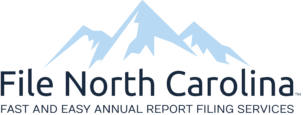Filing a North Carolina Annual Report is a yearly requirement for most businesses operating in North Carolina, even if North Carolina is not your business’s home state. Filing an annual report is not a financial statement. The act of filing an annual report is intended to update the state on your activity and document any changes regarding the organization’s address, officers, and legal details. Filing your annual report helps ensure proper registration as a legal entity in the state. It contains information about the company and is due whether the entity is actively conducting business.
Who Must File an Annual Report?
The following foreign and domestic companies must file an annual report to the North Carolina Secretary of State:
- C Corporation
- Limited Liability Company (LLC)
- Limited Liability Partnership (LLP)
- Limited Liability Limited Partnership (LLLP)
A domestic company was formed in the state, and a foreign company was formed in a different state but is operating in North Carolina.
The following companies are not required to file an annual report to the North Carolina Secretary of State:
- Professional Corporations
- Professional LLCs
- Nonprofit Corporations
When Are Annual Reports Due?
The deadline for submitting a business’s annual report to the North Carolina Secretary of State depends on the type of business entity.
Below are the annual report due dates by the applicable business entity:
| Business Entity Type | Annual Report Due Date |
| Limited Liability Companies (LLCs) | April 15 |
| Foreign LLCs | April 15 |
| Corporations | 15th day of the 4th month after fiscal year end. |
| Foreign Corporations | 15th day of the 4th month after fiscal year end. |
| Limited Liability Partnerships (LLPs) | 15th day of the 4th month after fiscal year end. |
| Foreign Limited Liability Partnerships (LLPs) | 15th day of the 4th month after fiscal year end. |
| Nonprofits, Cooperatives, and Religious Corporations | Not Required to File an Annual Report |
Late Fees: North Carolina does not charge penalty fees for failing to file; however, the state will send a “Notice for Grounds for Administrative Dissolution or Revocation of Foreign Business.” You then have 60 days to complete the annual report.
How Do You File Your Annual Report?
Businesses can e-file their North Carolina annual reports through the Secretary of State website or use a third-party filing service like File North Carolina.
My company has been dissolved. Do I still need to file an annual report?
A company no longer needs to submit an annual report once it officially dissolves with the state.
Why Hire File North Carolina to Complete my Annual Reports?
File North Carolina reminds our clients of the filing due dates and streamlines the annual report filing process to make filing easy. Our streamlined process is fast and convenient while also providing insight into what is currently reported and on file with the state and providing you the tools to make edits. We will then file your annual report with the latest information and details regarding your company to ensure the state has all your applicable updates.
Rely on File North Carolina to file annual reports on your behalf to ensure they’re completed correctly and quickly. That way, you can focus on other aspects of your business.
What Information Do I Need to Provide?
We ask the most common information your business must provide when filing the annual reports:
- Company name and address listed in the company’s formation documents (e.g., in the Articles of Incorporation or Articles of Organization)
- Is the company U.S. military veteran-owned? (optional)
- Registered agent name and physical address
- Description of the nature of the business
- Principal office phone number
- Principal office email address (optional)
- Annual report receipt return email address (optional)
- Principal office street address (where corporate books are located or where business is being conducted)
- Mailing address
- Names and business addresses of LLC’s company officials
- Who (which LLC official) is executing the document
When completing the online form, much of the information is pre-entered, taken from the entity’s formation documents on file). The online form allows you to confirm that information or change it.
What Are the Fees for North Carolina?
The costs vary by business entity type and whether the company files online or by paper.
| Business Entity Type | State Fee | File North Carolina Processing Fee |
| Limited Liability Companies (LLCs) | $200 | $95 |
| Foreign LLCs | $200 | $95 |
| Corporations | $25 | $50 |
| Foreign Corporations | $25 | $50 |
| Limited Liability Partnerships (LLPs) | $203 | Service Not Offered |
| Foreign Limited Liability Partnerships (LLPs) | $203 | Service Not Offered |
| Nonprofits, Cooperatives, and Religious Corporations | Not Required | N/A |
If filing directly with the Secretary of State by mail, include a check or money order and send the annual report and payment to:
N.C. Department of the Secretary of State
P.O. Box 29525
Raleigh, NC 27626-0525
What Are the Penalties for Not Filing?
There is no late fee for filing an annual report after the due date. However, the state may issue a notice of pending dissolution of the entity’s status. Businesses are given 60 days after that notice to submit their annual report.
Although it doesn’t cost anything additional to file and pay the annual report late, the possibility of having the business entity dissolved (terminated) is nothing to mess with! That can have dire consequences and cost business owners money and heartache in the long run. For example, failing to comply with annual report requirements could cost business owners the protection of the corporate veil that separates their assets from the business. As a result, business owners and others who act on behalf of the entity might be held personally responsible for the legal and financial debts of the business. That could result in losing personal assets such as savings accounts, personal property, vehicles, etc.
Where Can I Find More Information?
We encourage you to discuss your obligations with your attorney and tax advisor. Also, visit the North Carolina Secretary of State’s website for information about registering a business in the state, annual reports, and other ongoing compliance requirements.
File North Carolina is Here to Help!
For North Carolina businesses with a fiscal year end of December 31st, you must file the annual report by April 15th. Let File North Carolina help you comply with our easy-to-use filing services to ensure your business stays in good standing and meets the annual report requirements for North Carolina.
North Carolina Annual Report FAQ
How long does North Carolina Annual Report processing take?
Online filings are processed within 1-2 days, but mailed filings take significantly longer. If you file by mail, you could wait up to 12 weeks for your report to be processed.
Are there initial reports in North Carolina?
No, North Carolina does not require new businesses to file initial reports.
Are there late fees or penalties if I don’t file my North Carolina Annual Report?
North Carolina doesn’t charge late fees; however, the state will send your registered agent a “Notice of Grounds for Administrative Dissolution or Revocation for Foreign Businesses.” If you respond within 60 days, your business may continue.
Who can file a North Carolina Annual Report?
After starting a business in North Carolina, any authorized person may sign the North Carolina Annual Report. An authorized person is someone the business permits to act on its behalf. The person filing the annual report can be someone within the company (such as a director or manager) or someone outside of the business you hire to file your report. When you hire a File North Carolina for annual report service, we complete and file your North Carolina Annual Report.
Do North Carolina Annual Reports need original signatures?
No, North Carolina doesn’t require original signatures.
Where can I get more information about the State of North Carolina Annual Report filing?
Mailing Address:
North Carolina Secretary of State
Post Office Box 29622
Raleigh, North Carolina 27626-0622
T: (919) 814-5400
Email: [email protected]
Physical Address:
2 South Salisbury Street
Raleigh, North Carolina 27601-2903
Annual Reports Email: [email protected]
Annual Reports Fax: (919) 807-2081



